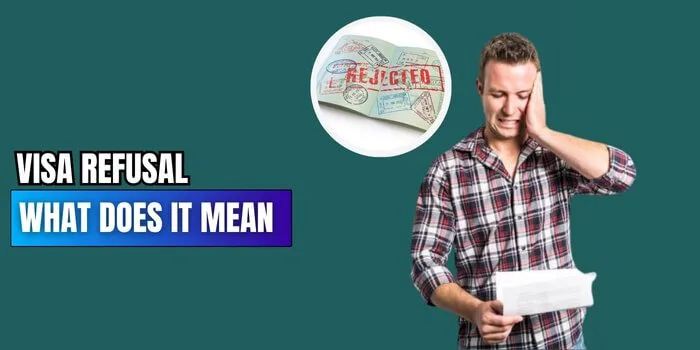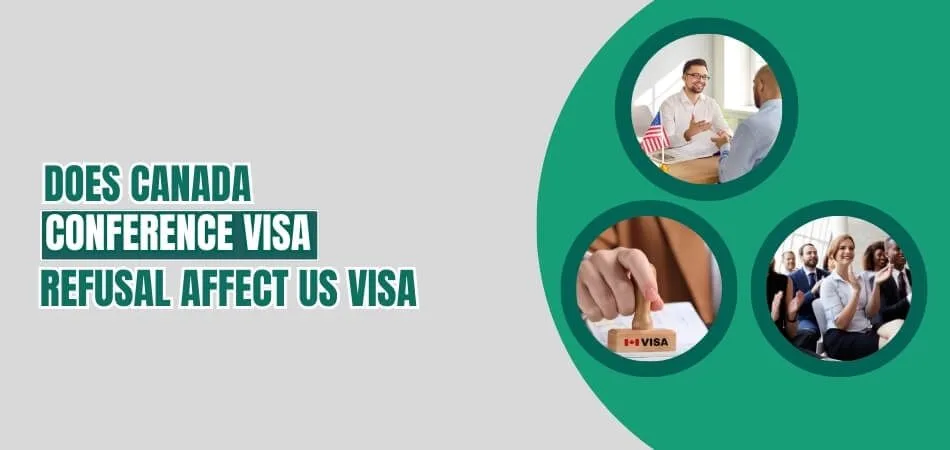The process of applying for a visa is often confusing and a source of concern for those attending international conferences. Among these, one common question stands out: “Does Canada conference visa refusal affect US visa?”
As American authorities consider past visa refusals in their evaluation process, a refusal from Canada can indirectly influence your application for a US visa. However, this does not mean automatic disqualification. Applicants are required to be transparent about any previous visa refusals and should be prepared to provide explanations if prompted.
Here, we provide detailed insights and advice on how to deal with the complexities of a Canadian visa refusal on a US visa application in this article.
Visa Refusal- What Does It Mean?
Visa refusal indicates your application didn’t meet the embassy’s requirements. It’s not just about denial; it reflects specific concerns or missing details. Addressing these issues is key to future success.
Each refusal comes with a reason, often tied to eligibility or documentation. This feedback is valuable for identifying what needs improvement. Applicants should view it as a roadmap for reapplication.
Turning a refusal into an approval requires understanding and action. Reassessing your application with the refusal reason in mind is crucial. It’s a step towards ensuring your next attempt aligns better with visa requirements.
Does Canada Conference Visa Refusal Affect US Visa?
Yes, a Canada conference visa refusal can indeed have implications on a US visa application. This connection arises not from a direct policy but from the practice of assessing an applicant’s visa history. A strong application relies on understanding the nuances behind this influence.
Here is a detailed explanation of does Canada conference visa refusal affects US visa:
Previous Visa Refusals
When applying for a US visa, applicants must disclose any past visa refusals. This transparency allows consular officers to assess risk factors more accurately. A prior refusal doesn’t automatically disqualify you but raises questions about your eligibility. It’s essential to explain the context and resolution of previous refusals clearly.
Consistency in Application
Inconsistencies between your Canada conference visa application and your US visa application can be problematic. Consular officers scrutinize the reasons behind past refusals, looking for patterns that might indicate potential issues. Maintaining consistency in the information provided across applications is crucial. Any discrepancy can lead to doubts about the credibility of your application.
Financial Stability
One common reason for visa refusal is the lack of financial stability. Both Canadian and US visa authorities require proof of financial means to cover your stay. A refusal from Canada on financial grounds can signal financial instability to US visa officers. Demonstrating improved financial stability is vital for a subsequent US visa application.
Ties to Home Country
Both countries assess your ties to your home country to gauge the likelihood of your return. A refusal from Canada might suggest inadequate ties, affecting the US visa officer’s perception. Strengthening evidence of strong ties to your home country can mitigate this concern. This includes employment, family, and property ties.
Addressing these areas effectively can help in presenting a stronger application to US visa authorities.
Reasons Behind Canada Conference Visa Refusals
Visas are crucial for many professionals and academics attending conferences in Canada. However, not all applications result in approval. By understanding common refusal reasons, applicants will be able to better handle this process.
- Incomplete applications often lead to visa refusals. Ensure all required fields are filled accurately to avoid automatic disqualification.
- Financial stability is a key consideration. Applicants must prove they have sufficient funds to cover their stay in Canada.
- Ties to the home country are essential. The embassy looks for strong reasons you will return home after your visit.
- Past immigration history can influence the decision. Any previous overstays or violations may raise concerns about compliance with visa terms.
- The purpose of your visit must be clear and credible. Vague or inconsistent explanations about attending the conference can result in refusal.
- Documentation supporting the application plays a critical role. Lack of proper invitation letters or conference details can weaken your case.
These common reasons for refusal can help applicants improve their chances of approval and smooth their journey to Canada.
How Do You Respond to a Canadian Conference Visa Refusal?
The refusal of a Canadian conference visa can be disheartening, but it’s not the end of the road. It’s crucial to approach the situation with a clear mind and a strategic plan. Steps are provided to help you respond effectively and increase your chances of succeeding in the future.
Step 1: Review the Refusal Letter
Carefully read the refusal letter to understand the specific reasons for your visa denial. This document outlines the areas of your application that failed to meet the requirements. Use this information as a foundation to address the weaknesses in your next application.
Step 2: Assess Your Application
Take a moment to critically review your initial application. Identify any potential gaps or weaknesses that align with the refusal reasons. Improving these areas is essential for a successful reapplication.
Step 3: Gather Additional Documents
Based on the refusal reasons, collect additional documents that strengthen your application. This may include more detailed financial records, stronger ties to your home country, or a more detailed invitation letter from the conference organizers.
Step 4: Write a Cover Letter
Prepare a cover letter for your new application, addressing the refusal reasons. Clearly explain how your situation has changed or provide additional information that was missing previously. This letter should directly address each refusal reason, demonstrating your eligibility and commitment.
Step 5: Re-apply or Appeal
Decide whether to reapply or appeal the decision, based on the refusal reasons and your new evidence. If significant improvements or additional information can be presented, reapplying may be the more effective route. Appeals are specific to cases where you believe an error was made in the decision process.
Step 6: Consult an Immigration Professional
If unsure about how to proceed, consider consulting with an immigration lawyer or a visa consultant. These professionals can offer personalized advice and help in preparing a stronger application. Their expertise can be particularly valuable in navigating complex refusal reasons.
A Canadian conference visa refusal requires a thoughtful review of the refusal letter, a critical assessment of your application, additional documentation, and perhaps professional guidance. You can increase your chances of success in future applications by addressing the issues raised in the refusal.
Methods to Re-Apply for a Canadian Visa Conference
An effective reapplication for a Canadian conference visa requires addressing the specific reasons for the initial refusal. This process requires careful preparation and attention to detail. An understanding of the several ways to reapply for a visa is crucial to a successful application.
Comprehensive Review and Documentation Update
Start by conducting a thorough review of your previous application to identify any shortcomings. Update all necessary documents, including financial statements and invitations from the conference. Ensure that these documents are current and accurately reflect your situation and intentions.
Addressing the Refusal Reasons Directly
In your new application, directly address the reasons for the previous refusal. Provide additional information or clarification that specifically counters the concerns raised in the refusal letter. This method demonstrates your responsiveness and attention to the visa requirements.
Seeking Professional Assistance
Consult an immigration lawyer or consultant if you feel the process is becoming overwhelming. Professionals can provide valuable insight and guidance on the application process. Their expertise can be especially helpful in complex cases or when multiple refusals have occurred.
Online Application and Tracking
Utilize the online application system offered by the Canadian government. This platform allows for easier submission of documents and real-time tracking of your application’s status. Online applications often result in quicker processing times compared to paper applications.
By thoroughly reviewing and updating your application, directly addressing refusal reasons, seeking professional help, and using the online application system, you can enhance your chances of approval.
Tips to Avoid Conference Visa Refusal
Conference visa applications require meticulous preparation and attention to detail to ensure success. A well-prepared application can significantly reduce the likelihood of refusal. Here are practical tips to enhance your application and avoid common pitfalls that lead to visa denials.
- Ensure Complete Documentation: Verify that all required documents are complete and accurately filled out. Incomplete applications are a common reason for visa refusal, so double-check everything.
- Demonstrate Financial Stability: Provide clear evidence of your financial stability to cover your stay. Bank statements and employment letters can prove you have sufficient funds.
- Clarify Purpose of Visit: Make sure your invitation letter to the conference is clear and detailed. A well-explained purpose of visit strengthens your application significantly.
- Show Strong Ties to Home Country: Evidence of strong ties to your home country is essential. Property deeds, employment contracts, and family ties help demonstrate your intent to return.
- Follow Application Instructions Precisely: Adhere strictly to the visa application instructions and guidelines. Any deviation from the prescribed process can lead to refusal.
- Consult with Experts: If possible, seek advice from visa consultants or individuals who have successfully obtained a conference visa. Their insights can provide valuable guidance and improve your chances of approval.
By following these tips, you can minimize the risk of refusal and make your travel plans with confidence.
Frequently Asked Questions about Does Canada Conference Visa Refusal Affect US Visa?
Here are some of the FAQs and their relevant answers for a clear concept about does Canada Conference visa refusal affects US Visa:
Can I Apply for A US Visa Immediately After a Canadian Visa Refusal?
Yes, you can apply for a US visa immediately after, but ensure you address the reasons for the Canadian visa refusal in your application.
Will the US Embassy Know About My Canadian Visa Refusal?
Yes, you should assume the US embassy might have access to this information, especially if you’re asked and required to disclose it.
How Should I Mention My Canadian Visa Refusal in My US Visa Application?
Be honest and concise. Explain the reasons for the refusal and any steps taken to address those issues.
Does a Canadian Visa Refusal Reduce My Chances of Getting a US Visa?
Not necessarily. If you can address the reasons for the refusal effectively, it may not significantly impact your US visa application.
What Documents Should I Provide to The US Consulate to Overcome a Canadian Visa Refusal?
Provide any documents that counteract the reasons for your Canadian visa refusal, such as stronger financial evidence or proof of ties to your home country.
Is There a Waiting Period After a Canadian Visa Refusal Before Applying for A US Visa?
No official waiting period exists, but it’s wise to wait until you have new information or circumstances that strengthen your application.
How Can a Canadian Visa Refusal Be a Positive Aspect of My US Visa Application?
A previous refusal can demonstrate your commitment to legal travel and transparency if you’ve taken constructive steps to address the refusal reasons.
Final Thoughts
Experiencing a visa refusal can be a setback, but it’s a chance to refine future applications. It teaches applicants the value of meticulous preparation and the need for complete, accurate documentation.
In the midst of uncertainty, the question “Does Canada conference visa refusal affect US visa?” serves as a critical consideration for many. It highlights how past decisions can influence future visa applications, urging a careful approach to transparency and detail.
Overcoming visa hurdles is about understanding the process and learning from past mistakes. With the right preparation and response to refusals, achieving visa approval becomes a more attainable goal, turning challenges into stepping stones toward success.








